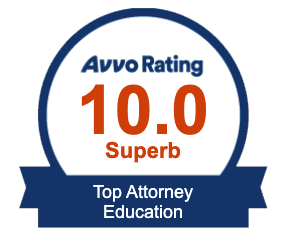It is now the IEP homestretch for school ending for the 2017-2018 school year. It is hard to believe the 2018-2019 school year will begin in August. Time passes quickly especially when you see your children grow up so fast. For parents, the summer is a time to be with their family. The kids are out of school. Most will enjoy the summertime and look forward to the time their children will return to school. For some children, they will be attending summer school or an extended school year program. Most others will spent time with their family, work, and enjoy the free time from school. But in the back of the minds of most families of children with disabilities, they are wondering if their child made adequate progress on their IEP goals and objects, whether their school provided appropriate instruction and services for them; whether their educational placement was appropriate, and whether the new school year will bring about changes.
As the school year is ending, I have received a number of calls from parents on school disciplinary problems. For children with disabilities, if the school system intends to suspend the child for more than 10 consecutive school days or change their educational placement, the school must convene a manifestation determination meeting. If the manifestation determination team finds the student’s conduct was directly related or caused by his disability, then the team has to comply with a number of legal requirements. Most importantly, the team cannot change the child’s educational placement unless the parents agree. On the other hand, if the manifestation determination team does not find the student’s conduct was directly related or caused by his disability, then the school system can discipline the child in the same manner as a regular education student. As a result, school systems will convene disciplinary hearings or tribunals. The purpose of these hearings is two-fold: First to determine if the child has violate the Student Code of Conduct; and second if so, then what discipline should be administered. I recently represented a student with disability who was facing suspension or expulsion for fighting with another student. The manifestation determination team did not find that the student’s conduct was directly related or caused by her disability. The hearing officer found that the student violated the Student Code of Conduct and suspended her for the remainder of the school year.
You might ask what happens to a special education student who has three weeks left in the school year and has been suspended for the remainder of the school year? Will the child miss the end of the year tests? Will the student be promoted to the next grade? Will the student be retained? In this situation, the IEP team met immediately after the school disciplinary hearing to determine what will be the child’s placement during the suspension. For the school system is still legally required to education a child with a disability even though she has been suspended from school for the remainder of the school year. The IEP team determined that she will receive eight hours of home bound instruction a week so that she can prepare for the year end exams and be promoted to the next grade beginning in August 2018. This is fortunate for this special education student because if she was a regular education student, then she would not be placed in a home bound program and receive eight hours of week of instruction through the end of the school year. Most likely the regular education student would have been placed in an Alternative School Program for the remainder of the school year. Special education laws provide protections for students with disabilities even if they are suspended or expelled from school for violation of the Student Code of Conduct.
I am also dealing with two cases involving children that were denied special education eligibility under the IDEA. School systems must convene an eligibility meeting within 30 days after testing is completed to determine whether the child meets the legal requirements for receiving special education and related services. These are very important meetings. In these two cases, the school system determined the child did not meet the requirements for special education and related services. The legal requirements, in short, are the child must have a disability under one of the 13 eligibility categories under the IDEA. The child’s disability must adversely affect their educational performance. And the child must be in need of special education and related services. If the school system determines eligibility, then an IEP team meets to develop an IEP for the child. But if the school system does not find eligibility under the IDEA, then it must still refer the child to determine whether he meets the requirements for special education or related services under Section 504. In my 33 plus years of experiences in representing children with disabilities, I have almost never encountered a school system that timely refers the child to the Section 504/ADA coordinator to determine eligibility under Section 504. This is a violation of Section 504. A child who does not meet the legal requirements for IDEA eligibility may meet the legal requirements for Section 504 eligibility. If you want further information on IDEA/Section 504 eligibility, please contact me.

